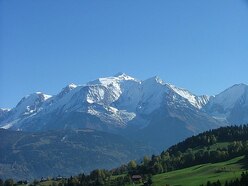
In the news this week, “Vanishing glaciers threaten alpine biodiversity.” https://www.sciencedaily.com/releases/2023/05/230504111831.htm Science Daily is a web source I check regularly to keep up on the latest scientific research on ecological concerns. Though I am no expert in biology, or ecological science, research is disseminated in a way the average literate citizen can know what scientists are working on, and what we are learning. It is the responsibility of all citizens in the 21st Century to be, to the best of their ability, ecologically literate. I was recently talking with somebody who thought there was a time (I guess in the 90s?) scientists thought plastic bags were better for the environment than paper bags at grocery stores. I explained that I requested paper throughout these decades of increased plastic use. The misperception is easily dismissed as nonsense, but this broad lack of knowledge is a danger to humanity’s (and countless other diverse interlinked species) continued survival on Mother Earth. We are choking on plastics. Plastics have never been a good idea. They’re a dirty technology and they’re replaceable in most (not all) of their modern-day uses.
Back to this week’s news: Researchers at the University of Leeds studied the results of climate changed generated glacier melting, and its impact on invertebrates that live in cold meltwater rivers in the European Alps. As species lose habitat, they face further pressure from tourism, skiing and hydroelectric plants. “Writing in the paper, the researchers describe the "substantial work" that is necessary to protect the biodiversity in rivers that are being fed by retreating glaciers. The locations where glaciers still exist late in the 21st century are likely to be prioritised for hydropower dam construction and ski resort development.”
The 21st Century has been described as the century of the Sixth Great Mass Extinction. We are facing loss of an addition 1/3 of all species by the end of the century. Previous mass extinctions have occurred because of asteroids, ocean acidification, and volcanic activity. https://ourworldindata.org/mass-extinctions Today, a mass extinction is being driven by anthropocentrism--placing human wants above all other species needs, which includes use of cheap oil, plastics, and other polluting consumer products that hurts impoverished humans and non-human beings. It is the responsibility of music teachers and students to keep alive the songs of species (including metaphorical songs for non-vocal plants, fungi, and animals) that our industries have placed in danger.
How might a music educator approach ecological literacy in this case?
Students can be directed to write songs for specific at-risk species, requiring student research of the species, how they live and survive, and challenges to the species; to cultivate public empathy (e.g., producing an informance/performance concert), and, ultimately, form plans of action to conserve species and ecosystems.
DS
Link to image: https://upload.wikimedia.org/wikipedia/commons/thumb/8/82/Mont_Blanc_oct_2004.JPG/640px-Mont_Blanc_oct_2004.JPG
 RSS Feed
RSS Feed
